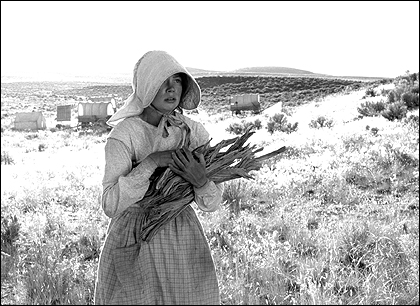
Over the Desert and Through the Rocks
Kelly Reichardts latest quiet road trip
by Molly Templeton
MEEKS CUTOFF: Directed and edited by Kelly Reichardt. Written by Jon Raymond. Cinematography, Chris Blauvelt. Music, Jeff Grace. Starring Michelle Williams, Bruce Greenwood, Paul Dano, Neal Huff, Shirley Henderson, Will Patton, Zoe Kazan and Rod Rondeaux. Oscilloscope Pictures, 2011. PG. 104 minutes.
 |
Long minutes pass before anyone in Meeks Cutoff says anything. The first word is scratched, not said: LOST, read the letters carved into a piece of wood. But the silence, occasionally broken by an atmospheric score, effectively describes the quiet trek of the films eight characters as something other than a steady passage.
Its easy to forget, amid the Willamette Valleys pollen and greenery, that Eastern Oregon is the way it is: dry, spare, bright and brown at once. Kelly Reichardt (Wendy and Lucy)s new film emphasizes the strangeness of it, the distance from the lush, damp valley the settlers are seeking. Pitch black at night and so sunny in midday that the film takes on a brownish haze, the land is inhospitable, foreign and dust-coated. Each day offers another hot trial to pass through on the way to the valleys rivers and forests. The land seems to repeat, piles of rock after dry hill after scrubby brush, especially as seen in Reichardts tight framing. The vistas are as sprawling as the black night sky, but just as the womens bonnets cut off their peripheral vision, the camera often snips out whats not right in front of us, carving a limited world out of a much larger one.
The landscape of Meeks Cutoff cant be overemphasized. If Reichardts un-Western sits, in many ways, in stark opposition to the violent vision of Cormac McCarthy or the pioneering adventures of Laura Ingalls Wilder or the dramatic glory of Deadwood, it still shares with other tales of the West a staggering sense of place, and of the size of the world as it once looked (and still does, in certain corners). The harsh vistas of Meeks Cutoff are as unforgettable as the blood-soaked sands of McCarthys Blood Meridian, but where McCarthy steeped the West in bloodshed and destruction, Reichardt and her screenwriter, Jon Raymond, strip much of the aggression and violence out of the story, replacing it with a peculiar blend of idealism, modern sensibility and dramatic ambiguity.
The couples following the talkative braggart Stephen Meek (Bruce Greenwood) across Oregon are at first nearly indistinguishable, except that one pair has a child and one pair is somewhat younger than the other two. Personalities emerge via the details of their trip: The younger man begins to show his frustration, his wife her gentleness; one womans generous streak shines through as she shares her bread. Her husband (Will Patton), more than the others, trusts her with the details of the trip. The men stand a distance off to confer, their words lost in the evening, but he later shares with Emily (Michelle Williams) their growing suspicion that Meek doesnt know where hes going. Emily gradually comes to the front of the narrative and the group of travelers, calmly asserting she with growing confidence as she chooses, time and again, not to be ruled by fear. When the men capture a Native American man (Rod Rondeaux), she opts to hope that he can and will lead them to water; shes efficient in an incredibly taut moment when the situation calls for her to handle a gun.
Meeks Cutoff builds with no sense of hurry, pacing itself step by step with its tired characters as they walk into an unknown fate. Deliberate and exacting, the film projects a vivid sense of the struggle and fear of those who made their way west while simultaneously transforming the Western narrative. The end feels less like how things would have gone than how things maybe should have gone; its narratively open-ended while definitive in its depiction of shifting power. The wagons make their slow, bumpy way across a path not yet well-trod, shedding bits of the past as they go, clocks and rocking chairs left to fall apart under the sun, and the film steps neatly into the Western canon, a purposeful, exhausting, subtle and meticulously shaped story in which the old, suspicious, violent way of doing things loses ground, quiet takes over from gunshots and hooves, and leaders are made, not appointed.